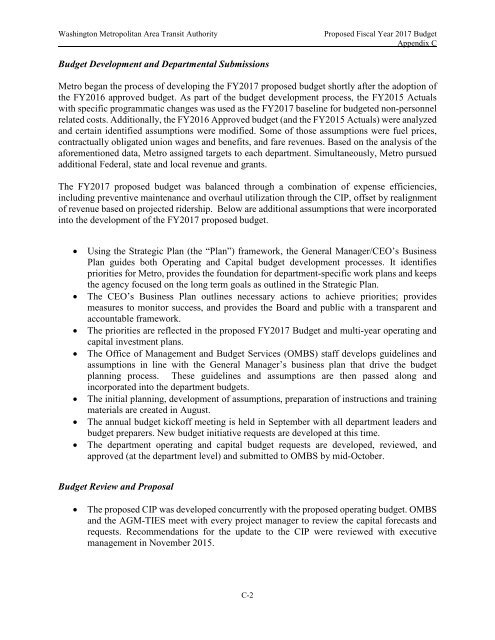FY2017 PROPOSED BUDGET
FY2017%20Proposed%20Budget
FY2017%20Proposed%20Budget
Create successful ePaper yourself
Turn your PDF publications into a flip-book with our unique Google optimized e-Paper software.
Washington Metropolitan Area Transit Authority<br />
Proposed Fiscal Year 2017 Budget<br />
Appendix C<br />
Budget Development and Departmental Submissions<br />
Metro began the process of developing the <strong>FY2017</strong> proposed budget shortly after the adoption of<br />
the FY2016 approved budget. As part of the budget development process, the FY2015 Actuals<br />
with specific programmatic changes was used as the <strong>FY2017</strong> baseline for budgeted non-personnel<br />
related costs. Additionally, the FY2016 Approved budget (and the FY2015 Actuals) were analyzed<br />
and certain identified assumptions were modified. Some of those assumptions were fuel prices,<br />
contractually obligated union wages and benefits, and fare revenues. Based on the analysis of the<br />
aforementioned data, Metro assigned targets to each department. Simultaneously, Metro pursued<br />
additional Federal, state and local revenue and grants.<br />
The <strong>FY2017</strong> proposed budget was balanced through a combination of expense efficiencies,<br />
including preventive maintenance and overhaul utilization through the CIP, offset by realignment<br />
of revenue based on projected ridership. Below are additional assumptions that were incorporated<br />
into the development of the <strong>FY2017</strong> proposed budget.<br />
• Using the Strategic Plan (the “Plan”) framework, the General Manager/CEO’s Business<br />
Plan guides both Operating and Capital budget development processes. It identifies<br />
priorities for Metro, provides the foundation for department-specific work plans and keeps<br />
the agency focused on the long term goals as outlined in the Strategic Plan.<br />
• The CEO’s Business Plan outlines necessary actions to achieve priorities; provides<br />
measures to monitor success, and provides the Board and public with a transparent and<br />
accountable framework.<br />
• The priorities are reflected in the proposed <strong>FY2017</strong> Budget and multi-year operating and<br />
capital investment plans.<br />
• The Office of Management and Budget Services (OMBS) staff develops guidelines and<br />
assumptions in line with the General Manager’s business plan that drive the budget<br />
planning process. These guidelines and assumptions are then passed along and<br />
incorporated into the department budgets.<br />
• The initial planning, development of assumptions, preparation of instructions and training<br />
materials are created in August.<br />
• The annual budget kickoff meeting is held in September with all department leaders and<br />
budget preparers. New budget initiative requests are developed at this time.<br />
• The department operating and capital budget requests are developed, reviewed, and<br />
approved (at the department level) and submitted to OMBS by mid-October.<br />
Budget Review and Proposal<br />
• The proposed CIP was developed concurrently with the proposed operating budget. OMBS<br />
and the AGM-TIES meet with every project manager to review the capital forecasts and<br />
requests. Recommendations for the update to the CIP were reviewed with executive<br />
management in November 2015.<br />
C-2


